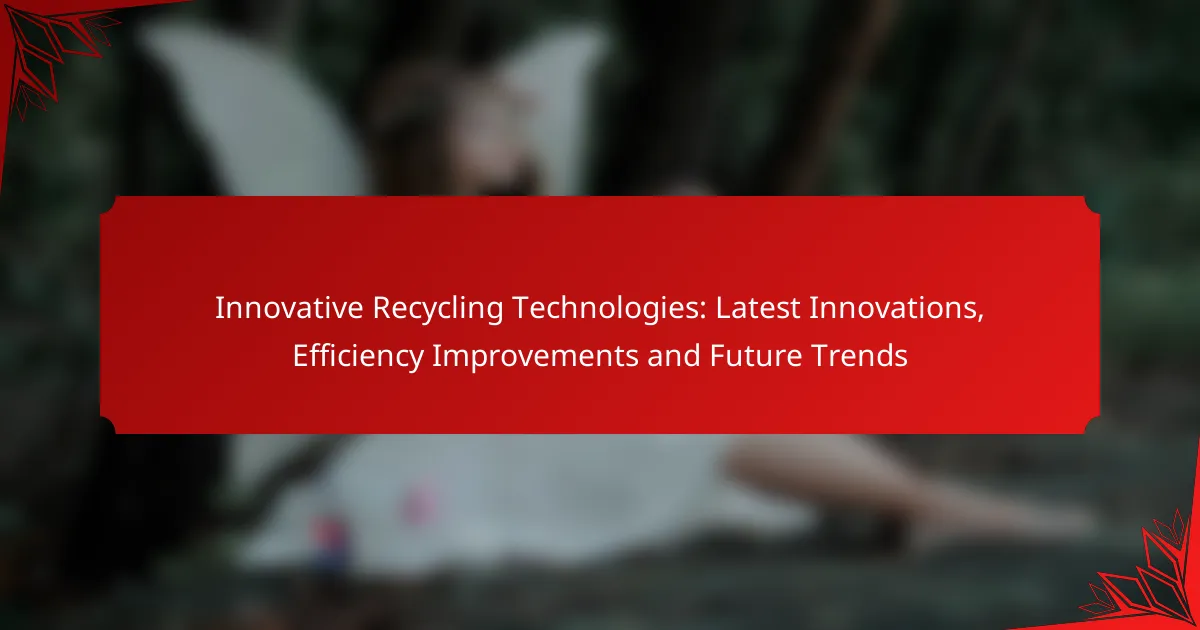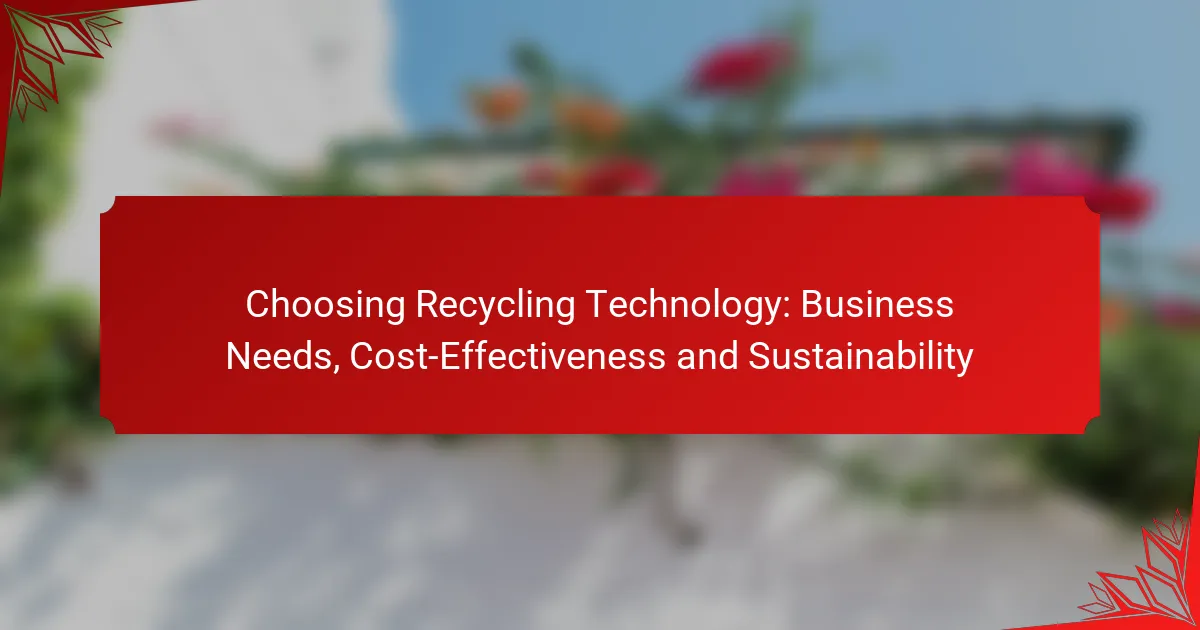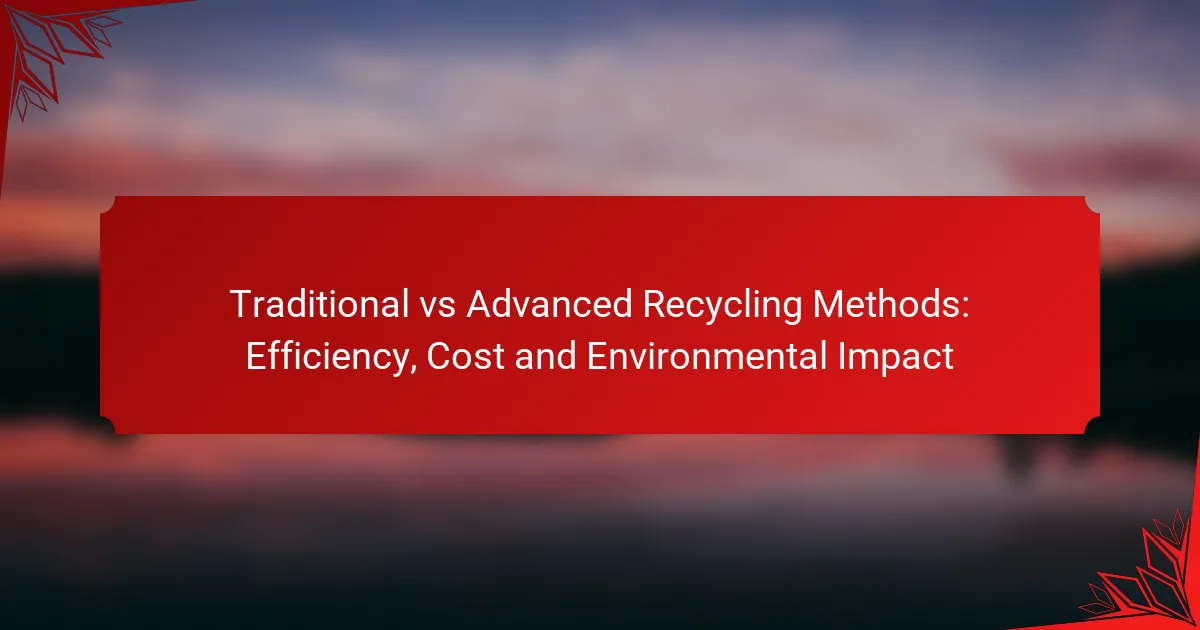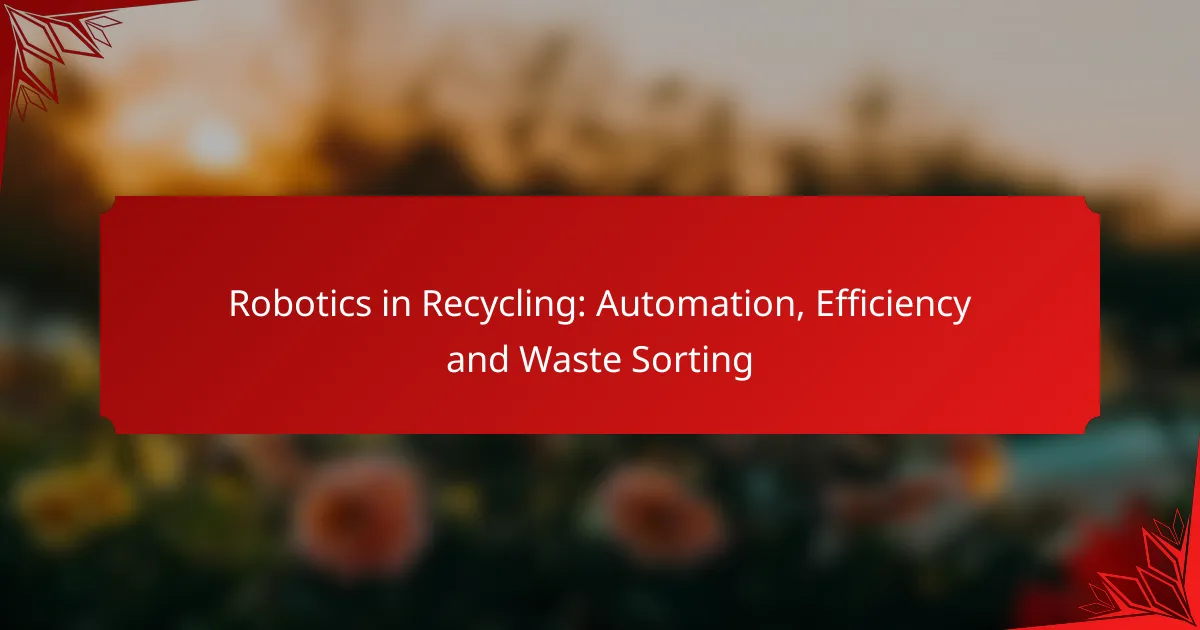Innovative recycling technologies are revolutionizing the way we manage waste by significantly improving efficiency and sustainability. Recent advancements focus on optimizing material recovery rates and minimizing contamination, which not only enhances resource utilization but also reduces operational costs. Key players in this field are developing cutting-edge sorting systems and waste management solutions that promote the use of recycled materials across various industries.
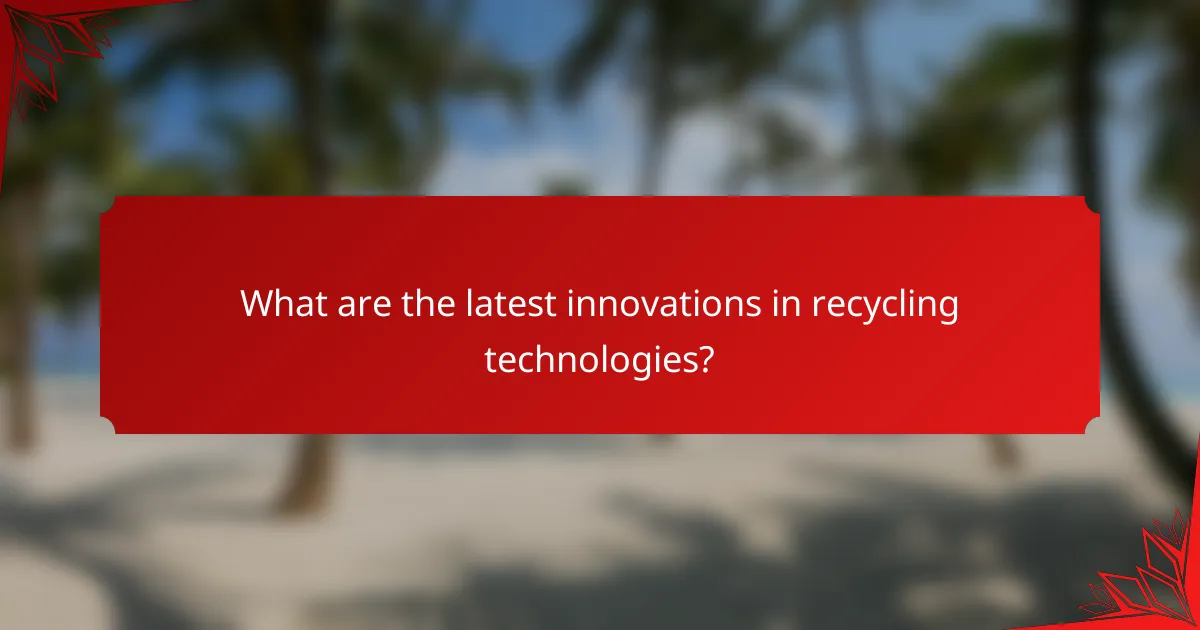
What are the latest innovations in recycling technologies?
The latest innovations in recycling technologies focus on enhancing efficiency and sustainability. These advancements aim to improve material recovery rates, reduce waste, and promote the use of recycled materials in various industries.
Advanced sorting systems
Advanced sorting systems utilize technologies such as near-infrared spectroscopy and machine learning to identify and separate different types of materials more effectively. These systems can significantly increase the purity of recycled materials, which is essential for their reuse in manufacturing.
For instance, automated sorting facilities can process thousands of tons of recyclables per day, achieving separation efficiencies of over 90%. Investing in these systems can lead to lower operational costs and higher quality outputs.
Biodegradable plastics
Biodegradable plastics represent a significant shift in recycling technologies, as they are designed to break down more easily in the environment. These materials can reduce landfill waste and pollution, making them a more sustainable option compared to traditional plastics.
However, the recycling of biodegradable plastics requires specific conditions and processes, often leading to confusion in recycling streams. It’s crucial for consumers and businesses to understand local regulations regarding the disposal and recycling of these materials to ensure proper handling.
AI-driven recycling robots
AI-driven recycling robots are transforming the recycling industry by automating the sorting process. These robots use artificial intelligence to recognize and sort various materials, improving efficiency and reducing labor costs.
For example, some facilities have reported a 30% increase in sorting speed and a significant reduction in contamination rates when using AI robots. Implementing these technologies can help recycling centers manage increasing volumes of waste more effectively.
Closed-loop recycling processes
Closed-loop recycling processes involve reusing materials within the same production cycle, minimizing waste and resource consumption. This method is particularly effective in industries like textiles and packaging, where materials can be continuously recycled into new products.
Companies adopting closed-loop systems often see reduced material costs and enhanced sustainability profiles. However, establishing these processes may require upfront investments in technology and infrastructure.
3D printing from recycled materials
3D printing from recycled materials is an innovative approach that allows manufacturers to create new products from waste. This technology not only reduces the demand for virgin materials but also promotes a circular economy.
Many businesses are now using recycled plastics and metals in their 3D printing processes, which can lower production costs and environmental impact. It’s essential to ensure that the recycled materials meet the necessary quality standards for specific applications to maintain product integrity.
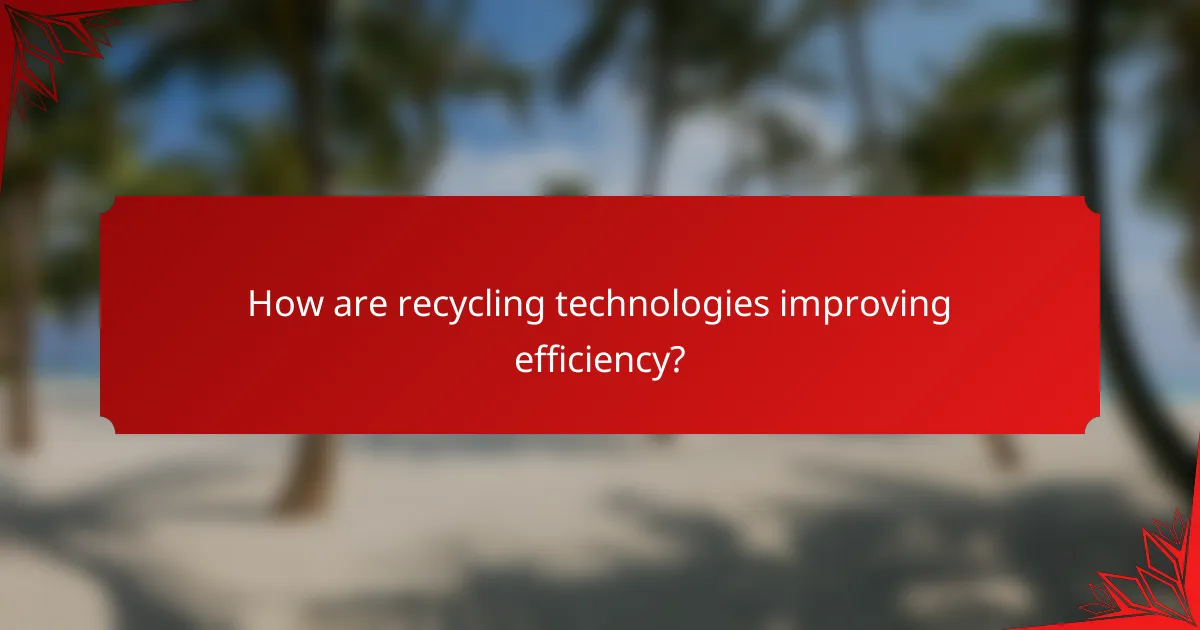
How are recycling technologies improving efficiency?
Recycling technologies are enhancing efficiency by optimizing processes that increase material recovery and reduce contamination. These advancements lead to better resource utilization and lower operational costs, making recycling more effective and sustainable.
Enhanced material recovery rates
Innovative recycling technologies are significantly improving material recovery rates by employing advanced sorting and separation techniques. For instance, optical sorting systems can identify and separate various materials based on their properties, achieving recovery rates that can exceed 90% for certain recyclables.
Additionally, the integration of artificial intelligence in sorting facilities allows for continuous learning and adaptation, further enhancing recovery efficiency. Facilities that adopt these technologies often see a marked increase in the volume of materials diverted from landfills.
Reduction in contamination levels
Reducing contamination levels is crucial for improving recycling efficiency, as high contamination can lead to lower quality recycled materials. New technologies, such as automated sorting systems and advanced cleaning processes, help minimize contamination by accurately separating recyclables from non-recyclables.
For example, some facilities are using air classifiers and water separation techniques to remove contaminants effectively. This not only improves the quality of the recycled output but also ensures compliance with industry standards, making the recycling process more viable.
Real-time data analytics
Real-time data analytics is transforming recycling operations by providing insights into material flows and processing efficiency. By utilizing sensors and IoT devices, facilities can monitor operations continuously, allowing for immediate adjustments to optimize performance.
This data-driven approach helps identify bottlenecks and inefficiencies, enabling operators to make informed decisions that enhance throughput and reduce downtime. Facilities leveraging real-time analytics often report improved operational efficiency and reduced costs.
Energy-efficient processing methods
Energy-efficient processing methods are essential for improving the overall sustainability of recycling operations. Technologies such as low-energy shredders and advanced pyrolysis systems consume significantly less energy compared to traditional methods, leading to lower operational costs and reduced carbon footprints.
Implementing these energy-efficient technologies can result in savings of up to 30% in energy consumption, making recycling not only more efficient but also more environmentally friendly. Facilities should consider investing in such technologies to enhance their sustainability efforts while improving efficiency.

What are the key players in innovative recycling technologies?
Key players in innovative recycling technologies include companies that develop advanced sorting systems, waste management solutions, and sustainable practices. These organizations are at the forefront of enhancing recycling efficiency and promoting environmental sustainability.
Tomra Sorting Solutions
Tomra Sorting Solutions specializes in sensor-based sorting technologies that enhance material recovery rates. Their systems utilize advanced sensors to identify and separate various materials, such as plastics, metals, and organics, ensuring higher purity levels in recycled outputs.
By implementing Tomra’s technologies, recycling facilities can significantly reduce contamination rates and improve overall efficiency. Their solutions are widely adopted across Europe and North America, showcasing their global impact in the recycling sector.
Veolia Environmental Services
Veolia Environmental Services is a leader in waste management and recycling, offering a comprehensive range of services from collection to processing. They focus on integrating innovative technologies to optimize resource recovery and minimize landfill use.
Veolia employs techniques such as mechanical biological treatment and anaerobic digestion, which convert waste into energy and valuable materials. Their commitment to sustainability aligns with European Union regulations aimed at reducing waste and promoting circular economy practices.
Waste Management Inc.
Waste Management Inc. is one of the largest waste management companies in the United States, emphasizing recycling and sustainability. They operate numerous recycling facilities equipped with state-of-the-art technologies for sorting and processing materials.
The company has invested heavily in automation and data analytics to enhance operational efficiency. Their initiatives include public education campaigns to encourage recycling participation and reduce contamination in collected materials.
Recology
Recology is a prominent waste management company based in California, known for its innovative recycling programs. They focus on zero waste initiatives, aiming to divert as much waste as possible from landfills through effective recycling and composting strategies.
Recology employs advanced sorting technologies and community engagement to improve recycling rates. Their approach includes providing educational resources to residents and businesses, ensuring that more materials are correctly sorted and processed for recycling.
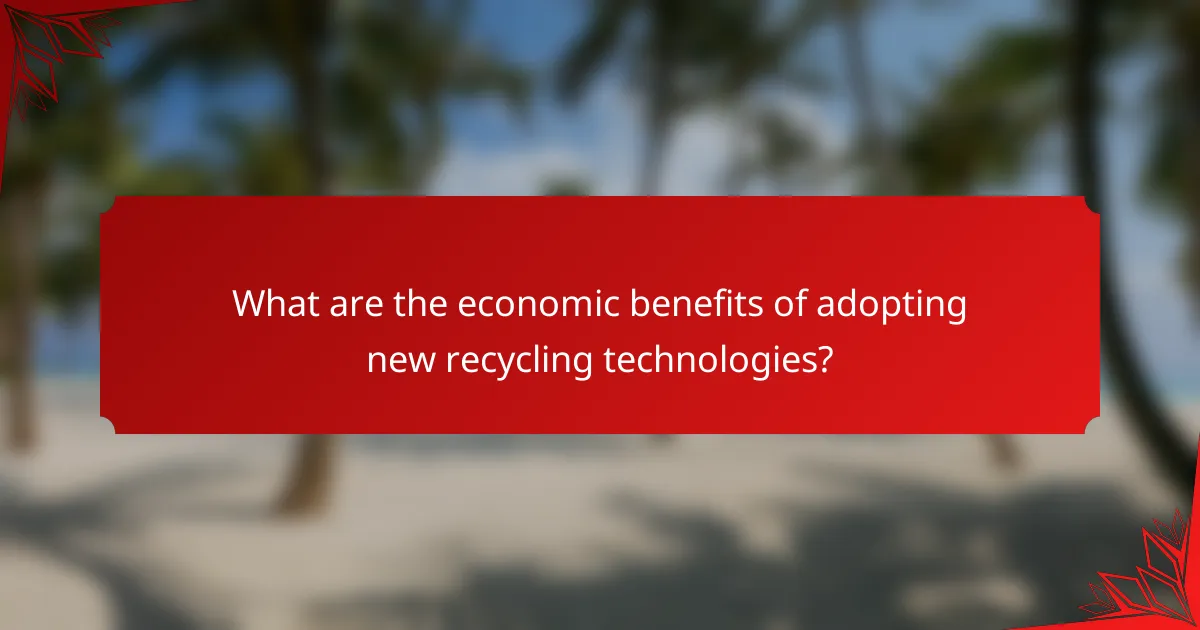
What are the economic benefits of adopting new recycling technologies?
Adopting new recycling technologies can lead to significant economic benefits, including reduced costs in waste management, job creation in green industries, and increased material value. These advantages not only enhance profitability for businesses but also contribute to a more sustainable economy.
Cost savings in waste management
New recycling technologies can lower waste management costs by improving efficiency in sorting and processing materials. For instance, automated sorting systems can reduce labor costs and minimize contamination, leading to higher recovery rates of recyclable materials.
Additionally, advanced recycling methods can convert waste into usable products, decreasing the need for landfill space and associated disposal fees. Companies that invest in these technologies may see savings ranging from 10% to 30% in their overall waste management expenses.
Job creation in green industries
The implementation of innovative recycling technologies fosters job creation in various sectors, particularly in green industries. As companies adopt these technologies, they often require skilled workers for operations, maintenance, and management, leading to an increase in employment opportunities.
According to estimates, the recycling sector can create significantly more jobs per ton of waste processed compared to traditional waste disposal methods. This shift not only supports local economies but also promotes sustainable practices that benefit the environment.
Increased material value
New recycling technologies enhance the quality and marketability of recycled materials, increasing their overall value. Improved processing techniques can yield higher purity levels, making recycled materials more attractive to manufacturers looking for sustainable inputs.
For example, advanced chemical recycling can convert plastics back into their original monomers, allowing for the production of high-quality new products. This can lead to a price premium for recycled materials, which can be 20% to 50% higher than lower-quality alternatives.
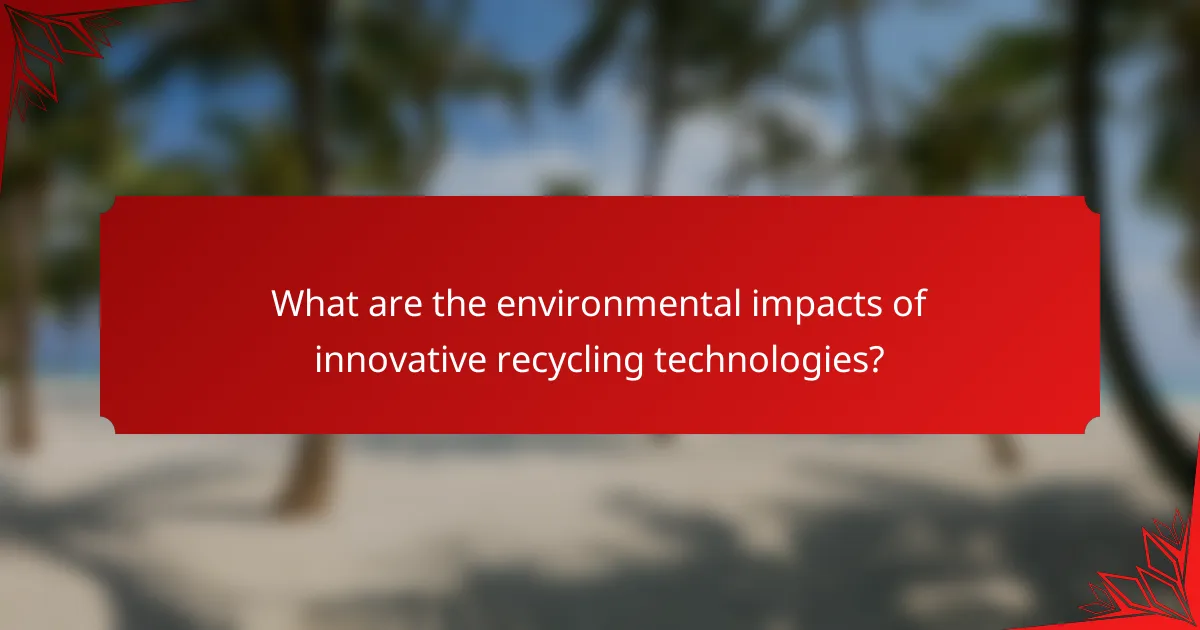
What are the environmental impacts of innovative recycling technologies?
Innovative recycling technologies significantly reduce waste and conserve resources, leading to lower environmental impacts. These advancements enhance material recovery rates and minimize pollution associated with traditional waste management practices.
Latest Innovations in Recycling Technologies
Recent innovations in recycling technologies include advanced sorting systems, chemical recycling, and biotechnological methods. Automated sorting systems use AI and machine learning to improve the accuracy of material separation, which increases recycling efficiency. Chemical recycling processes break down plastics into their original monomers, allowing for higher-quality recycled materials.
Efficiency Improvements in Recycling Processes
Efficiency improvements in recycling processes focus on reducing energy consumption and increasing throughput. For instance, modern shredders and granulators can process materials faster while using less energy, resulting in lower operational costs. Implementing closed-loop systems can further enhance efficiency by reusing energy and materials within the recycling facility.
Future Trends in Recycling Technologies
Future trends in recycling technologies are expected to emphasize circular economy principles and sustainable practices. Innovations such as decentralized recycling units and on-site processing facilities may become more common, allowing communities to manage waste locally. Additionally, advancements in digital tracking and blockchain technology could improve transparency and traceability in recycling supply chains.
